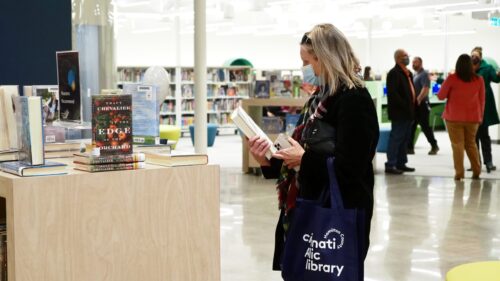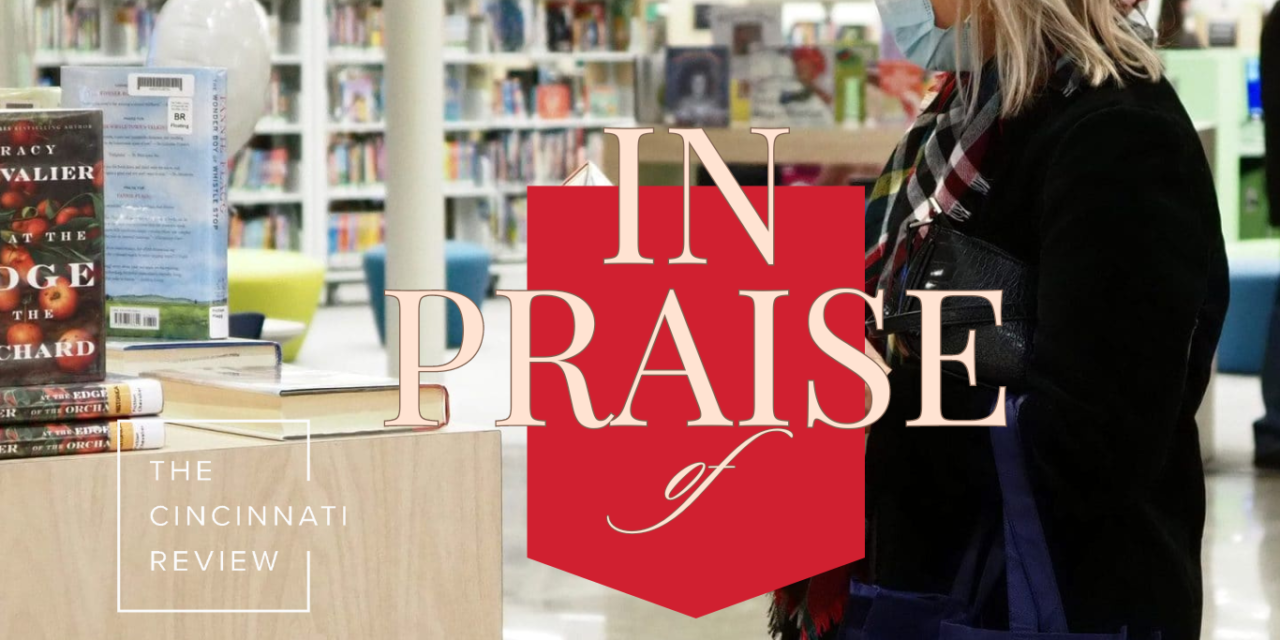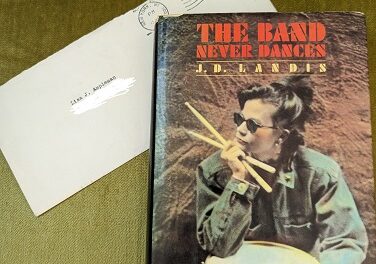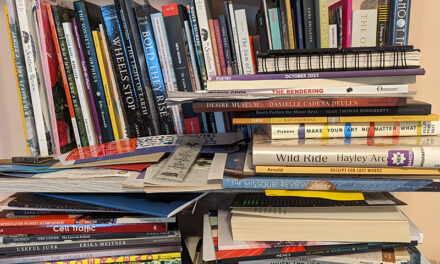
Courtesy the Cincinnati & Hamilton County Public Library
Managing Editor Lisa Ampleman: It probably surprises no one who knows me well that my favorite place in childhood was the library. About a two-minute drive from our house, next to the municipal pool, the Florissant Valley branch of the St. Louis County Library was a pretty nondescript building: not quite brutalist, but beige brick with only a few high windows. Still, its interior design from the 1980s and ’90s is the setting for some of my dreams even today, the checkout desk just right of the entrance, the reference room off past that.
I collected stickers on a summer reading chart there, and had my first job as a teen, and plumbed the new books section each week, and got dusty khaki-pant knees from the year the stacks were in the basement, while they renovated the top floor. Later, after I left for college, my mother worked at the circulation desk there, and my sister worked at a different branch, and my brother at a third branch.
I love these bastions that support reading and free speech. Wherever I’ve lived—from a small town in Wisconsin to a DC suburb—I’ve always searched out the public library.
Of course I love the libraries for the books. In an earlier column about getting rid of books, I mentioned that libraries’ holdings mean that you don’t need to keep every single copy of every single book you own. As a voracious reader, I need library books to keep my habit going without going broke. Recently I checked out Our Moon: How Earth’s Celestial Companion Transformed the Planet, Guided Evolution, and Made Us Who We Are by Rebecca Boyle, even though my to-be-read pile from AWP purchases is still way too large.
But there’s more to a library than just books at your local branch. To have the full library experience, consider doing some of these:
Use interlibrary loan to request books your library system doesn’t have available. For example, I can search databases that include Ohio public libraries and academic libraries, request a book from Youngstown or Kent or Toledo, and have it sent to my neighborhood library for pickup.
Or, if your library system has this option, suggest purchases of books that they don’t already have. This is an easy way to support writers without breaking your own budget. Keep in mind that sometimes libraries can’t buy a particular book because of how it’s distributed, but otherwise they truly do their best to get titles. The Cincinnati & Hamilton County Public Library lets users suggest up to thirty purchases per month. I’ve made suggestions, but never that many!
Explore the Libby app or similar services to listen to audiobooks, read e-books, and more. Have you run out of podcasts to binge, like I often do? Check out audiobooks that cover the same ground, like true crime, celebrity lives, self-help, etc. Want to read on your commute? Libby has a lot of contemporary poetry that you can read right in the app.
Get new skills from online training. The Cincinnati library has access for users to learn American Sign Language or other languages, study business concepts through O’Reilly, technology and coding through Treehouse, and obtain certificates and practice a wide range of skills on LinkedIn Learning and other services. Have you been wanting to know how to use Adobe products to create visual poetry, for example? There’s an app for that.
Access genealogical and historical materials. Are you writing about family history? Your library system might, like ours, have archives and genealogical databases to help you do that work.
It’s not hard for me to sing the praises of libraries, clearly, and I suspect this is not an unpopular opinion among our readership. But in a time when small-town libraries are closing temporarily because of staff resignations in the wake of book bans, and the American Library Association is characterized as partisan by legislators in states like Alabama, it seems like the right thing to do.
Two final thoughts:
My eight-year-old son still has trouble understanding the difference between a library and a bookstore sometimes—at both, we get books that end up in our house, to be read together. Sure, we return library books eventually, but the temporary or permanent residence with us doesn’t seem to register to him as a distinction.
And a shoutout to the movie The Public, which I watched a couple weeks ago. Filmed in Cincinnati at the main branch of the public library, it criticizes social policy through a story that has a librarian-supervisor, played by Emilio Estevez, joining with a group of unhoused people who take over part of the library at closing time one night during a cold snap (the late Michael K. Williams plays a de facto leader of the group). It’s not a perfect movie, but Estevez enters the role with intensity. I was thrilled at all the local references and, more importantly, admired the purposeful release of details that showed an arc of redemption. (I’m less convinced at the end that anything substantial has changed, but that’s more society’s fault than the movie’s.)
I bring up The Public because it demonstrates something I didn’t mention above, that our libraries help people of all social classes and are sometimes the closest thing to a community center an area has. They have tax forms and voter guides in the lobby, they hire social workers to help patrons, and they serve as a print-shop, meeting place, after-school program, and entertainment provider, all in one building.
Of course, I borrowed that DVD of The Public from my local branch, where it was free and automatically renewed. I hope you find something unexpected and good at your own library.









